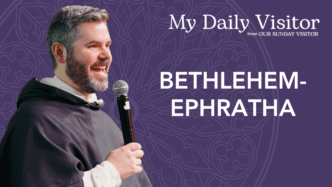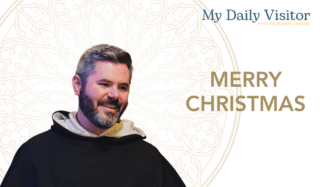Today is Dec. 19, Thursday of the Third Week of Advent.
Today at Mass we hear the story of Zechariah and Elizabeth, which begins, “In the days of Herod, King of Judea, there was a priest named Zechariah of the priestly division of Abijah; his wife was from the daughters of Aaron, and her name was Elizabeth” (Lk 1:5).
Advent is a season of hope, which we see especially in Zechariah and Elizabeth’s story. But Advent also invites us to reflect on the forces of darkness that opposed the coming of Christ. One such figure is Herod the Great, whose name is forever linked to the story of the Holy Family’s flight into Egypt and the massacre of the Holy Innocents (Mt 2:13-18).
Herod the Great was a ruler appointed by the Romans; he governed Judea from 37 to 4 B.C. He was known for his ambitious building projects, including the magnificent expansion of the Second Temple in Jerusalem, which stood as a symbol of Jewish identity. Yet Herod was also a man of profound insecurity, paranoia and ruthlessness. Obsessed with maintaining his power, he executed members of his own family, including his wife and sons, to eliminate perceived threats to his throne. It was one of these sons, Herod Antipas, who later murdered John the Baptist.
When the Magi arrived in Jerusalem proclaiming the birth of the “king of the Jews,” Herod’s fear and jealousy were ignited. He viewed this news not as a fulfillment of Israel’s long-awaited hope, but as a direct challenge to his power. Scripture tells us he sought to deceive the Magi, asking them to report back on the child’s location so he could “pay him homage” (Mt 2:8). In reality, Herod intended to destroy the child who threatened his worldly authority.
Human ambition vs. the humility of Christ
Herod’s story is a stark reminder of the spiritual battle waged around the coming of Christ. In Herod, we see the darkness of pride, fear and attachment to earthly power. He symbolizes the rejection of God’s plan in favor of self-preservation and control. Herod’s actions illustrate the contrast between human ambition and the humility of the Christ Child, who came not to seize power but to give His life for the salvation of the world.
As we journey through Advent, we must confront the Herod-like tendencies in our own hearts. Do we cling to power, prestige or control, resisting God’s will in our lives? Are we threatened by the call to surrender to the newborn King? Herod’s tragic legacy serves as a cautionary tale, but it also points to the victory of light over darkness. Despite Herod’s efforts, the Christ Child was protected, and the hope of salvation triumphed.
Let us pray,
O God, who through the child-bearing of the holy Virgin graciously revealed the radiance of your glory to the world, grant, we pray, that we may venerate with integrity of faith the mystery of so wondrous an Incarnation and always celebrate it with due reverence. Through our Lord Jesus Christ, your Son, who lives and reigns with you in the unity of the Holy Spirit, God, for ever and ever. Amen.






